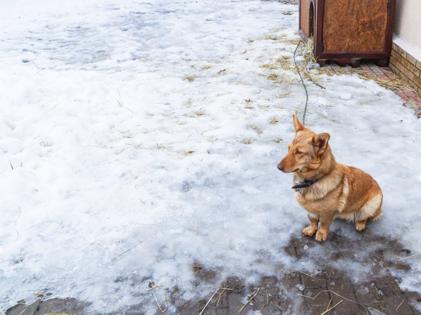Commentary: Winter is coming for chained dogs
Published in Op Eds
Imagine standing barefoot on frozen ground, tethered by a heavy chain, as you watch lights glow warmly in the house where your family lives—without you.
As winter’s chill creeps in and we draw closer to the comfort and safety of our homes, countless dogs spend the season shivering outside on a chain or confined to a pen. Sometimes they have a flimsy plastic barrel or leaky wooden box for “shelter.” Often, they have nothing at all. For them, winter isn’t a season of coziness—it’s a struggle to survive.
Every year, PETA fieldworkers and other humane officers respond to heartbreaking calls about dogs who froze to death, their stiff, lifeless bodies still attached to chains. Headlines have reported the freezing deaths of 43 dogs and cats so far this year—and those are just the cases that made the news. Most go unreported. That number will almost certainly climb as temperatures fall. These deaths are entirely preventable, yet they keep happening.
Like humans, other animals feel the cold. Hypothermia, frostbite and dehydration can set in quickly when temperatures drop. Water bowls freeze. Food becomes inedible. Once the chill sinks deep into a dog’s bones, survival depends on one thing: whether someone cares enough to bring them inside.
Chained dogs can’t escape biting wind or driving snow. Many die only feet from safety—tangled in their chains, unable to reach even the meager protection they may have. Others are found frozen inside their doghouses. Newborn puppies— whose mothers should have been spayed— don’t stand a chance and quickly succumb to hypothermia when exposed to the elements.
Those who do manage to survive suffer tremendously. Their skeletal bodies shake and tremble in a constant battle to stay warm. Their paws bleed from standing on ice and snow. The tips of their ears and tails rot and fall off from frostbite. Most never see a veterinarian, so illnesses and infections run rampant.
Existing outdoors isn’t just physically dangerous—it’s psychological torment. Dogs are social animals who crave companionship, mental stimulation and love. Banishing them to a lonely existence on a chain leads to severe distress, depression and anxiety. They pace in circles, bark endlessly, dig compulsively and chew on their doghouses until their teeth wear down to painful nubs. These are animals who once looked hopefully toward the door.
Many cities have enacted ordinances banning or restricting chaining. These laws save lives—not only of dogs but also of humans. Studies show that chained dogs are nearly three times more likely to attack than those who live indoors. Every animal has an innate “fight-or-flight” response to stress. Chained dogs do not have the option to flee and often react aggressively to make what scares them go away, whether it’s a loose dog or a wandering child.
Find out what your city’s tethering laws are. If they are nonexistent or weak, work to change that. Start by calling and e-mailing representatives to explain why dogs shouldn’t be chained outside. Encourage others to do the same by sharing ideas on social media or distributing flyers at community events.
Tethering bans save lives, but each of us must also take responsibility for the animals we’ve chosen to care for and those in our neighborhoods. Every dog deserves a warm bed, nutritious food, clean water and a place inside the home among family. If you see a dog left out in the cold, speak up. Politely urge the owner to bring them indoors. If they refuse, contact your local animal control agency and the police, if necessary. Leaving an animal to freeze to death is illegal in every state, and your call can mean the difference between life and death.
It’s too late for those who have already perished, but it’s not too late for the many others who will soon be waiting, shivering and hoping someone will care enough to open the door. Let’s work to make sure they’re not left out in the cold this winter—or ever again.
____
Melissa Rae Sanger is a licensed veterinary technician and a staff writer for the PETA Foundation, 501 Front St., Norfolk, VA 23510; www.PETA.org.
_____
©2025 Tribune Content Agency, LLC.
























































Comments